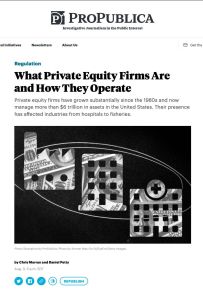Rejoignez getAbstract pour lire le résumé !

Rejoignez getAbstract pour lire le résumé !
Chris Morran and Daniel Petty
What Private Equity Firms Are and How They Operate
ProPublica, 2022
Aperçu
Private equity now deploys more than $6 trillion of capital in US businesses.
Recommendation
The private equity model is unique in capital markets: Investors directly acquire a business; reorganize its operations, financials and management; and then exit the company through a sale for more than the original purchase price. While this framework profitably serves private equity investors, troubling aspects lurk behind the scenes. Investigative journalists Chris Morran and Daniel Petty delve into the sector to explore how – and if – private equity creates value for companies and their stakeholders. Executives, students and investors will find this an informative report.
Summary
About the Authors
Chris Morran is an audience editor at ProPublica, where Daniel Petty is the director of audience strategy.























Comment on this summary